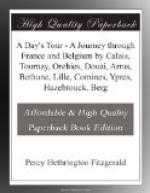But it is now close on midnight, and we are drawing near land; the eye of the French phare grows fiercer and more glaring, until, close on midnight, the traveller finds the blinding light flashed full on him, as the vessel rushes past the wickerwork pier-head. One or two beings, whose unhappy constitution it is to be miserable and wretched at the very whisper of the word ‘SEA,’ drag themselves up from below, rejoicing that here is CALAIS. Beyond rises the clustered town confined within its walls. As we glide in between the friendly arms of the openwork pier, the shadowy outlines of the low-lying town take shape and enlarge, dotted with lamps as though pricked over with pin-holes. The fiery clock of the station, that sits up all night from year’s end to year’s end; the dark figures with tumbrils, and a stray coach waiting; the yellow gateway and drawbridge of the fortress just beyond, and the chiming of carillons in a wheezy fashion from the old watch-tower within, make up a picture.
[Illustration: HOGARTH’S GATE (CALAIS)]
[Illustration: HALL OF THE STAPLE, (Calais)]
Such, indeed, it used to be—not without its poetry, too; but the old Calais days are gone. Now the travellers land far away down the pier, at the new-fangled ‘Calais Maritime,’ forsooth! and do not even approach the old town. The fishing-boats, laid up side by side along the piers, are shadowy. It seems a scene in a play. The great sea is behind us and all round. It is a curious feeling, thinking of the nervous unrest of the place, that has gone on for a century, and that will probably go on for centuries more. Certainly, to a person who has never been abroad, this midnight scene would be a picture not without a flavour of romance. But such glimpses of poetry are held intrusive in these matter-of-fact days.
There is more than an hour to wait, whilst the passengers gorge in the huge salle, and the baggage is got ashore. So I wander away up to the town.
How picturesque that stroll! Not wholly levelled are the old yellow walls; the railway-station with its one eye, and clock that never sleeps, opens its jaws with a cheerful bright light, like an inn fire; dark figures in cowls, soldiers, sailors, flit about; curiously-shaped tumbrils for the baggage lie up in ordinary. Here is the old arched gate, ditch, and drawbridge; Hogarth’s old bridge and archway, where he drew the ‘Roast Beef of Old England.’ Passing over the bridge into the town unchallenged, I find a narrow street with yellow houses—the white shutters, the porches, the first glance of which affects one so curiously and reveals France. Here is the Place of Arms in the centre, whence all streets radiate. What more picturesque scene!—the moon above, the irregular houses straggling round, the quaint old town-hall, with its elegant tower, and rather wheezy but most musical chimes; its neighbour, the black, solemn watch-tower, rising rude and abrupt,




